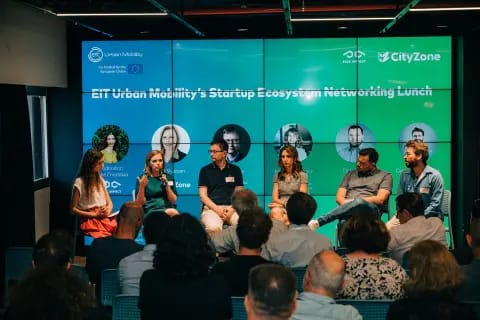Advancing urban mobility: Startups pave way for freedom of movement

EIT Urban Mobility, a collaborative endeavor between the European Union and private entities, addresses urban mobility concerns.
In a bold move, Keren Beit Cohen, head of Strategic Partnerships at EIT Urban Mobility, reveals a staggering budget of 400 million euros allocated for urban mobility projects. Cohen seeks pioneering startups to invest in, predicting immense profitability for those solving urban mobility woes swiftly.
Considering the Moovit app's transformative impact, Cohen explains her search for similar startups: "Consider the Moovit app's influence on people's lives. I'm on the lookout for startups like that."
EIT Urban Mobility, a collaborative endeavor between the European Union and private entities, addresses urban mobility concerns by encouraging positive shifts in city movement for enhanced livability, boasting funding from the Union and a vast network comprising 300 partners, including corporations, research institutes, universities, cities, and governmental bodies across Europe.
Unveiling Potential
Beit Cohen, a 47-year-old mother of two, hails from the Lehavim local council. Eight years ago, she relocated to the Netherlands due to her husband's job, bringing a multitude of degrees ranging from mathematics and astrophysics to law and behavioral sciences.
"My multidisciplinary background is advantageous in my startup involvement," she states. "I initially ventured into startups in Israel as a consultant for pre-investment stages. I assisted investors in evaluating startups holistically—product, team, market, and potential."
Assessing a fledgling company's potential, with just an idea to its name, remains an arduous task. Following her move, Beit Cohen engaged with accelerators and incubators that fast-track startups with financial and social value. This marked the inception of her quest to champion startups that deliver financial returns while advancing environmental and social goals.
That sounds interesting.
"The challenge is formidable. The global startup community is still grappling with integrating impact into the equation. The dichotomy was clear in the past: you were either nonprofit or for-profit. Today, investors—governments and corporations alike—strive to bridge these realms."
For the past two years, Beit Cohen has steered the advancement of urban mobility across European cities and Horizon 2020 nations, including Israel. Cities grapple with overcrowding, traffic congestion, and shrinking public spaces, culminating in heightened insecurity and pollution. Notably, two-thirds of Europe's population resides in cities, underscoring the magnitude of challenges for urban dwellers, the cities themselves, and the environment.
What plans do you have for the future?
"We maintain that startups and technology are key to resolving various challenges. Our role as catalysts is to expedite this process, effecting rapid improvement. This is no longer just a concern; it's an existential imperative."
"Our mandate is to champion processes and technologies enhancing city resident-friendliness. This encompasses increased living space, reduced cars, enhanced safety, and greater inclusivity for marginalized demographics due to constrained urban environments—such as individuals with disabilities and parents navigating narrow sidewalks with strollers. We've secured a 400-million-euro budget from the European Union until 2026 to channel into innovative projects and startups."
Through their investment arm, Beit Cohen notes, "Since 2020, we've invested in 80 early-stage startups from 24 countries, including four Israeli startups: AD Knight (enhancing pedestrian safety and traffic monitoring through data collection from mobile devices), Trailze (a navigation system aiding micromobility companies in ensuring user safety), Cognata (platform for AI-guided autonomous vehicle training and digital twin creation), and ITC Intelligent Traffic Control (AI-based software for traffic jam prediction and prevention)."
Do the urban mobility challenges in Israel align with those in Europe?
"Europe's diversity is so pronounced that even comparisons between its own cities are challenging. Amsterdam, a prime example of bicycle infrastructure, safety, and public space, contrasts with Copenhagen, a leader in overall quality of life and urban mobility. Rome, Milan, and Paris each present distinct challenges. Eastern European cities, while facing different challenges, also lead in other domains. Thus, comparing Israel to Europe remains intricate due to Europe's inherent divergence."
However, how do you view the situation in Israel regarding this matter?
Looking at the Israeli scenario, Beit Cohen remarks, "Consider Tel Aviv. To someone from a European city, it might seem car-dominated. Yet, what stands out is the city's long-term perspective and action. Tel Aviv Municipality reached out to us seeking startups to tackle defined problems.
For instance, the issue of micromobility theft, occurring every 18 minutes, needs solving to encourage such transport. An innovative solution from a London startup was chosen for testing. Similar challenges in micromobility safety led us to collaborate with an Israeli startup, focusing on data collection and danger alerts."
Striving for Change
"We're not only concentrating on Tel Aviv, but also Beer Sheva, Haifa, and more. Urban mobility significantly influences daily life, time, serenity, and security. What's essential in Israel is enhancing awareness and municipalities and the state articulating, 'Here's a challenge, aid us in resolving it.' It's about raising awareness and defining problems."
"Europe hosts a host of cities inviting us to address their challenges. We encourage Israeli entrepreneurs to engage in Milan, Paris, Barcelona, and Prague, resolving European urban issues."
"We financially back these urban mobility pilot projects. We're on the lookout for startups in urban mobility, particularly those focused on inclusive transportation. This entails enhancing mobility for all demographics—people with disabilities, parents with small children, women, the elderly, and those needing a more accessible and secure environment. Despite startup endeavors, this remains unsolved. It's our top priority for the upcoming year."
Challenges in Inclusion
"Approximately 1.3 billion people, or 16% of the global population, experience significant disabilities. Often, 70% of these disabilities are invisible—ranging from visual and hearing impairments to intellectual or sensory challenges. Startups addressing inclusive transportation face hurdles entering accelerator programs and securing investments. Their stories may lack the allure of fintech or cybersecurity. The problem lies with investors, who sometimes overlook the social value alongside economic potential. However, a shift is occurring, with many foundations now seeking ventures with social impact."
Making a Difference
Beit Cohen, currently visiting as part of the "8200 Impact" program, initiated by the 8200 Alumni Association, is dedicated to advancing startups in the impact-tech sphere. Their objective is to address significant social and environmental challenges through advanced technology for the betterment of society and the economy in Israel and globally.
"Our reputation as investors excelling in startup support, business development, and recruitment stems from our global team of portfolio managers and ecosystem agents—leading startup communities in Europe. We're closely aligned with top mobility accelerators in Paris, micro-mobility hubs in Amsterdam and San Francisco, and, in Tel Aviv, 8200 Impact partnered with Citizen. Next year, we'll extend collaborations to London, Milan, and Berlin."
Beit Cohen underscores, "8200 Impact plays a pivotal role in recommending startups for our investment in urban mobility. Startups endorsed by them stand a higher chance of securing our investment. They specifically embrace the European context of inclusive transportation startups and have established an accelerator with us. Their startup heritage, professional approach, and expertise in impact prompted our partnership."
"8200 Impact, together with Citizen, bridges Israel and Europe for the urban mobility community—startups, investors, companies, cities, universities, and decision-makers. We welcome everyone to join the multitude of initiatives in this field. As investors, we predict this market to generate around $600 billion in revenue by 2030."
Furthermore, an important note for aspiring startup founders emerges: "We're particularly interested in startups led or co-led by women. Such ventures receive higher consideration during our evaluations," asserts Beit Cohen.
What do you find most satisfying thing about your job?
Reflecting on her role, she adds, "After years in the startup sphere, entwined with investors and finance, the chance to merge social, environmental, and technological aspects in my work is deeply gratifying. Our generation embodies a different perspective, and everyone should be a part of it. My current role grants me the privilege to harmonize the technological, economic, and social spheres. For me, that's truly an honor."
Jerusalem Post Store
`; document.getElementById("linkPremium").innerHTML = cont; var divWithLink = document.getElementById("premium-link"); if (divWithLink !== null && divWithLink !== 'undefined') { divWithLink.style.border = "solid 1px #cb0f3e"; divWithLink.style.textAlign = "center"; divWithLink.style.marginBottom = "15px"; divWithLink.style.marginTop = "15px"; divWithLink.style.width = "100%"; divWithLink.style.backgroundColor = "#122952"; divWithLink.style.color = "#ffffff"; divWithLink.style.lineHeight = "1.5"; } } (function (v, i) { });


